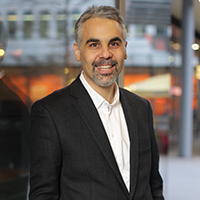Book Mailing: Starting January 13, unsigned hardcover copies of The Myth of Experience will be shipped to paid registrants.
Talk synopsis: In business and life, experience is deemed essential for an accurate understanding of the world. We feel confident with experience-based decisions. We want leaders with outstanding track records and managers who have worked in relevant fields. Yet experience can be filtered or distorted in a wide variety of ways, reinforcing misperceptions without us being aware. By recognizing this fundamental problem, we can design mechanisms that would help us and our organizations learn the right lessons from experience and improve decisions.
Book Synopsis: Experience is a great teacher . . . except when it isn’t. In this groundbreaking guide, learn how the past can deceive and limit us — and how healthy skepticism can build a better world.
Our personal experience is key to who we are and what we do. We judge others by their experience and are judged by ours. Society venerates experience. From doctors to teachers to managers to presidents, the more experience the better. It’s not surprising then, that we often fall back on experience when making decisions, an easy way to make judgements about the future, a constant teacher that provides clear lessons. Yet, this intuitive reliance on experience is misplaced.
In The Myth of Experience, behavioral scientists Emre Soyer and Robin Hogarth take a transformative look at experience and the many ways it deceives and misleads us. From distorting the past to limiting creativity to reducing happiness, experience can cause misperceptions and then reinforce them without our awareness. Instead, the authors argue for a nuanced approach, where a healthy skepticism toward the lessons of experience results in more reliable decisions and sustainable growth.
Soyer and Hogarth illustrate the flaws of experience — with real-life examples from bloodletting to personal computers to pandemics — and distill cutting-edge research as a guide to decision-making, as well as provide the remedies needed to improve our judgments and choices in the workplace and beyond.

About Our Speaker: Dr. Soyer is a behavioural scientist and founder of SOYER Decision advisory, which offers organizations talks, workshops, and projects on strategic and creative decision making. He has collaborated both with international business schools (incl. INSEAD, Cass, TUM, ESSEC, SDA Bocconi, St. Gallen) and companies from different sectors (incl. Google, Amazon, Microsoft, Accenture, ING, BBVA, EY, Pfizer, Turkish Airlines, TBWA). Beyond his scholarly work, he has written for Harvard Business Review and MIT Sloan Management Review. More information is available at https://www.emresoyer.com/.
Questions: events@rotman.utoronto.ca, Daniel Ellul, (416) 978-6119